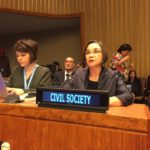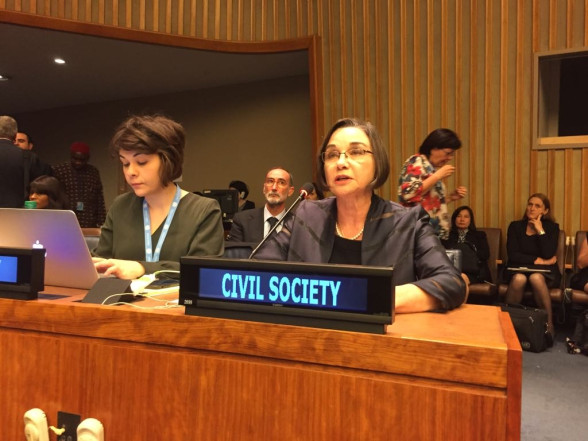 In June I was representing DAI in New York attending day 2 of the pre conference Civil Society Forum , followed by the 11th Session of the Conference Of State Parties (COSP) on the Convention of the Rights of Persons with Disabilities (CRPD).
In June I was representing DAI in New York attending day 2 of the pre conference Civil Society Forum , followed by the 11th Session of the Conference Of State Parties (COSP) on the Convention of the Rights of Persons with Disabilities (CRPD).
I apologise for a late report on it; and there are more to come! Clearly, there are not enough hours in each day, or days in each week!
The Overarching Theme this year of the 11th COSP was “Leaving no one behind through the full implementation of the CRPD”, with the following Subthemes and Crosscutting themes.
Sub-themes:
1. National fiscal space, public-private partnerships and international cooperation for strengthening the implementation of the CRPD
2. Women and girls with disabilities
3. Political participation and equal recognition before the law
Cross-cutting theme:
Promoting high-quality disability statistics and disaggregation of data by disability status for the full realization of the rights of persons with disabilities.
It was very pleasing to be given the opportunity to make various statements, the first one on Day 2 of the Civil Society Forum, the pre COSP event which I was only able to attend on the second day. It was an opportunity to ensure dementia was not forgotten as a condition causing acquired, and progressive cognitive disabilities.
My first statement, not pre-planned, but made in the discussion time after the main speakers in the aftrenoon of Day 2 of the Civil Society Forum on June 11, 2018 is listed below.
Statement 1 – Day 2 of the Civil Society Forum in New York, preceding the COSP.
My name is Kate Swaffer, a co founder and the current Chair and CEO of Dementia Alliance International. I’d first like to thank Klaus Lachwitz from the International Disability Alliance for mentioning dementia in his earlier comment, which was the first time this condition has made it into the discussions today.
I represent the 50 million people currently living with dementia, and am also one of them. The WHO states there is a new diagnosis of dementia every 3 seconds, and whilst dementia is a chronic, progressive terminal condition, it is also the leading cause of death and disability in older persons.
Yet most people in civil society do not yet see this condition as one that brings with it acquired cognitive disabilities, and I ask that we consider this today, to ensure that no one is left behind.
Dementia disproportionality impacts women and girls; more women are diagnosed with dementia, and women and girls make up more than two thirds of unpaid carers, and more than 70% are women and girls in Low and Middle Income Countries.
People with dementia are systematically excluded from rights based and equitable inclusion; the barriers are far more than dementia.
The real barriers are due to stigma, discrimination and the misperceptions about the capacity of people with dementia, and the many breaches of our most basic of human rights.
Inclusion continues to be a ‘tick box’ experience for many of us, and very often, self-advocacy requires significant self-funding, simply to ensure our rights under Articles 4.3 and 33.3, of which discussions have been exclusively focused on today.
We therefore ask for not only inclusion, but for appropriate funding from governments and NGO’s or DPO’s to ensure full and equal inclusion and participation of this cohort, to enable it. As many have speakers have stated today, this is undoubtedly our right.
Thank you.
Kate Swaffer
Chair, CEO & Co-founder
Dementia Alliance International
